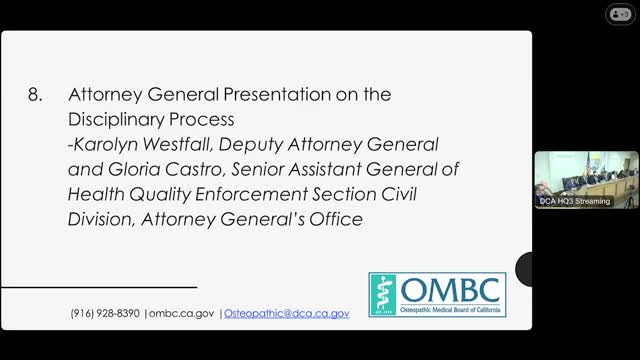California Attorney General's Office Reviews Disciplinary Process and Expert Reviewer Concerns
November 16, 2024 | Osteopathic Medical Board of California, Other State Agencies, Executive, California
This article was created by AI summarizing key points discussed. AI makes mistakes, so for full details and context, please refer to the video of the full meeting. Please report any errors so we can fix them. Report an error »

In a recent meeting of the Osteopathic Medical Board of California, key discussions centered around the disciplinary process for healthcare licensees, led by Deputy Attorney General Carolyn Westfall. The meeting, held on November 14, 2024, provided a comprehensive overview of the steps involved in addressing complaints against medical professionals, emphasizing the board's commitment to public protection.
Westfall outlined the disciplinary process, which begins with the investigation phase triggered by complaints from patients, family members, or mandated reports from hospitals. The board staff reviews these complaints, often referring them to the Division of Investigations for further scrutiny. This thorough investigation includes witness interviews, medical record procurement, and expert evaluations to determine if a licensee has deviated from the standard of care.
Once the investigation concludes, cases are forwarded to the Attorney General's office, where a Deputy Attorney General assesses the evidence to decide whether to prosecute. Westfall highlighted the importance of the "clear and convincing evidence" standard, which is crucial for establishing unprofessional conduct. This standard sits between the lower threshold of "preponderance of evidence" used in civil cases and the higher "beyond a reasonable doubt" standard in criminal cases.
The meeting also addressed the potential outcomes of the disciplinary process, which can range from a public reprimand to revocation of a medical license. Westfall explained that if a case proceeds to an administrative hearing, it resembles a court trial, with both sides presenting evidence before an administrative law judge. The board ultimately decides the case based on the judge's recommendations.
In conclusion, the Osteopathic Medical Board of California remains dedicated to ensuring that public safety is prioritized in its disciplinary actions. The detailed presentation by Westfall not only clarified the procedural aspects of handling complaints but also reinforced the board's mission to uphold the integrity of medical practice in California. As the board continues to navigate these complex cases, the emphasis on transparency and accountability remains paramount.
Westfall outlined the disciplinary process, which begins with the investigation phase triggered by complaints from patients, family members, or mandated reports from hospitals. The board staff reviews these complaints, often referring them to the Division of Investigations for further scrutiny. This thorough investigation includes witness interviews, medical record procurement, and expert evaluations to determine if a licensee has deviated from the standard of care.
Once the investigation concludes, cases are forwarded to the Attorney General's office, where a Deputy Attorney General assesses the evidence to decide whether to prosecute. Westfall highlighted the importance of the "clear and convincing evidence" standard, which is crucial for establishing unprofessional conduct. This standard sits between the lower threshold of "preponderance of evidence" used in civil cases and the higher "beyond a reasonable doubt" standard in criminal cases.
The meeting also addressed the potential outcomes of the disciplinary process, which can range from a public reprimand to revocation of a medical license. Westfall explained that if a case proceeds to an administrative hearing, it resembles a court trial, with both sides presenting evidence before an administrative law judge. The board ultimately decides the case based on the judge's recommendations.
In conclusion, the Osteopathic Medical Board of California remains dedicated to ensuring that public safety is prioritized in its disciplinary actions. The detailed presentation by Westfall not only clarified the procedural aspects of handling complaints but also reinforced the board's mission to uphold the integrity of medical practice in California. As the board continues to navigate these complex cases, the emphasis on transparency and accountability remains paramount.
View the Full Meeting & All Its Details
This article offers just a summary. Unlock complete video, transcripts, and insights as a Founder Member.
✓
Watch full, unedited meeting videos
✓
Search every word spoken in unlimited transcripts
✓
AI summaries & real-time alerts (all government levels)
✓
Permanent access to expanding government content
30-day money-back guarantee

